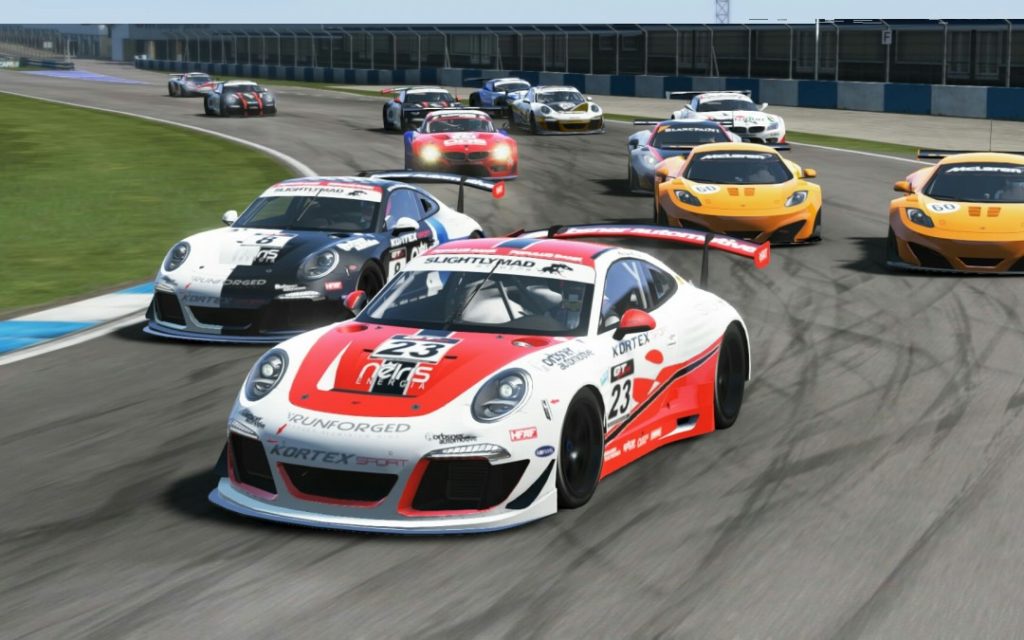Bandai Namco and developer Slightly Mad Studios are showcasing Project Cars 2 at E3 this week. The game companies have big plans for esports, when it comes to expanding the growing popularity of the racing franchise as a competitive game.
Andy Tudor, creative director of Slightly Mad Studios, told AListDaily that the studio took an “if we build it, they will come” attitude with esports on the original game.
“We knew from our work on Need for Speed Shift that people trying to beat each other’s times by autolog was extremely addictive, so much so that they might even play career mode,” Tudor said. “Players would want to jump back into the game just to beat somebody’s time. So we knew that there was a community out there that was really passionate about racing competitively at a very high level.”
The studio launched Project Cars esports quietly back in 2015, creating a season around community events with partner ESL. Tudor saw this draw a lot of fast racers, some of whom were part of esports teams in other franchises like Hearthstone and League of Legends.
In 2015 for Season 2, sponsors like Nvidia and Logitech came on board and competition was held at events like EGX and Paris Games Week. Teams formed and drivers started wearing jerseys and all of the competition was streamed for the community.
“There’s Logictech, Plantronics and Thrustmaster sponsoring other teams. So it’s a combination of hardware in the gaming space, but then also people from outside like McClaren, which has its own esports team. We’re starting to see more companies getting interested, including Red Bull and Monster Energy,” said Tudor.
Season 3 was recently announced, which will have a live Finals at Gamescom on the ESL One stage. There are also weekly online Cups with ESL and monthly finals around Europe. There’s League Officiale in Spain and the PlayStation Plus League in France.
Tudor said teams from iRacing and Forza have been invited to the season format because it’s where the champions play.
The studio has created a multiclass championship, which features pros with a dedicated prize pool at one level, and then a lower Challenger class with up-and-coming drivers racing on the same circuit at the same time. The idea is for the new talent to be showcased and potentially get picked up by the pro teams.
“The stuff that’s happening in Season 3 is directly going to affect Season 4, where we’ll introduce a competitive racing license accreditation in the game,” Tudor explained. “We now have online championships and a more structured way of creating these tournaments so that the people that win in Season 3 may get automatic qualification into Season 4.”
Season 3 features nine races before going into the Gamescom Final. Tudor said the goal is to help tell the stories of these teams and the rivalries that evolve over the course of the competition.
“Some of these teams are rivals and some players used to play for other teams before getting poached,” Tudor said. “It’s all about storytelling, so we’ve always had the mentality of having longer seasons where we can tell a story and build up the anticipation for the Final.”
As the studio began developing Project Cars 2, Tudor knew that eSports were the biggest thing that was keeping the game revving long after launch. The goal was to put all the features in there that were missing in the first game to bring this to a comparable level with big esports games like CS:GO.
“Online Championships is a brand new game mode that’s going to allow you to structure any series or championship or tournament that you want to put together,” Tudor said. “You invite the drivers in. You put them in specific cars with specific liveries. You put the schedule of the races on there. You set the rules and flags and penalties, and then all the drivers get notified when the first round is happening.”
The new game has a built-in director and broadcaster functionality for streaming. The director is responsible for choosing the camera angle and choosing the overlays on screen for the people at home who are watching, and then the broadcaster is responsible for actually streaming the thing off to Twitch or YouTube gaming or whatever. The broadcaster can also provide commentary as well.
“So just by having two friends you can, in essence, recreate the kind of broadcast-quality level that you see in big esports titles out there in your own home, and this is on PC, PlayStation 4 and Xbox One,” Tudor explained.
Project Cars 2 will also support virtual reality, which Tudor is a big fan of.
“Any live event that we do we will always have VR because we’re absolutely committed to it,” Tudor added. “Therefore it’s pretty much a given that if you see Project Cars at an esports event or live event, VR will play a big part. We have the potential to be the first big VR esport out there.”
Project Cars 2 in VR was featured at the Intel Extreme Masters (IEM) World Championship in Katowice, Poland earlier this year. The game is one of several titles Intel is showcasing as a potential esport of the future.
At a recent pre-E3 event in Los Angeles, Bandai Namco featured the VR version of Project Cars 2, including a sit-down motion simulator version that combined a VR headset with an accurate car simulation complete with pedals and a gear shifter, so there’s also that element that could be featured at esports events in the future.

